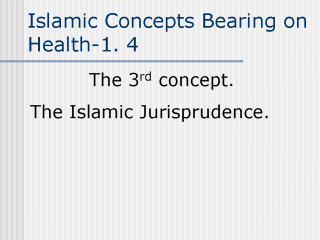| front |1 |2 |3 |4 |5 |6 |7 |8 |9 |10 |11 |12 |13 |14 |15 |16 |17 |18 |19 |20 |21 |22 |23 |24 |25 |26 |review |
 |
‘Islamic
Jurisprudence’ forms the third major concept in Islam. This concept is the cement that
holds together the two preceding concepts, the five pillars and the elements of
Imaan-Faith. For a Muslim, the most obvious ways of knowing what God wants them to do or
how to behave in any given situation is the Quran first and the Ahadith second.
Traditionally Islamic jurisprudence has been the arena in which the conditions, dynamics,
and meanings of the relationship between God and human beings were explored (El Fadl,
2001). This concept provides the basic rulings for Muslims on what they should do or not
do. The Quran is full of these rulings, some of them are explicit (Quran 2:188,282-3;
3:118,159; 4:6,15,135) and some of them are implicit (Quran 2:213,247; 4:60,141). Through
this concept Muslims scholars have compiled several discourses known as Fiqh (knowledge,
understanding and comprehension). Several discourses of knowledge have been written such
as the fiqh of worship (ibadat), fiqh of commercial transactions (muamalat), fiqh of
marriage (nikah) and fiqh of prosecution (aqdiah) while recently WHO EMRO has made an
attempt to writing a chapter on the fiqh of health. Despite the lack of a separate
discourse on the Fiqh of health, this knowledge is easily available in most of the other
fiqh discourses. (WHO-EMRO, 1989). Reference: El Fadl, K. A. (2001). Speaking in God’s nam. 185 Banbury road, Oxford OX2 7AR, England. Oneworld publications. World Health Organization Eastern Meditarrenean Office. (1989). (12th December 2001) Amman Declaration. Cairo. WHO-EMRO. Web site World Health Organization Eastern Meditarrenean Office. (2000). (12th December 2001) Health Education through religion series. Cairo. WHO-EMRO. Web site |
| front |1 |2 |3 |4 |5 |6 |7 |8 |9 |10 |11 |12 |13 |14 |15 |16 |17 |18 |19 |20 |21 |22 |23 |24 |25 |26 |review |